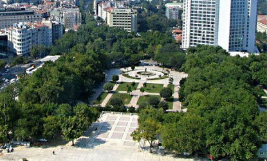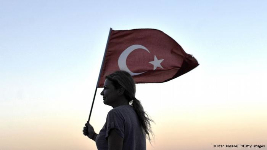BACKGROUND: Since the protests first erupted, Prime Minister Recep Tayyip Erdoğan has repeatedly cited the three successive election victories of his Justice and Development Party (AKP) as proof of its democratic legitimacy, dismissing the mass protests on the country’s streets and arguing that a government is only answerable to the people at the ballot box. His statements have been condemned by Turkish and foreign commentators as reflecting a “majoritarian” mindset in which democracy is regarded solely as an electoral mechanism rather than a set of values.
However, in order for elections to have any legitimacy, voters must be able to make not only a free choice but an informed one. This requires a free press. Similarly, enshrining “democratic values” in laws and regulations is meaningless unless there is an independent judicial system willing to uphold and protect them. It is debatable whether this has ever been the case in Turkey. But it is clear that, on both counts, the country has been moving backwards in recent years. Although there were numerous instances of the AKP government – or other factions within the broader Islamist movement – applying pressure directly, more pernicious was the climate of fear that was created. In the mainstream media, this resulted in widespread self-censorship. In the judicial system, the decisions of many judges and prosecutors were shaped not by the law but the fear of the personal repercussions if they antagonized either the AKP itself or influential Islamist interest groups, such as the Gülen Movement.
Under such circumstances it was not surprising that, as the most powerful person in the country, Erdoğan started to believe that he could do whatever he wanted. He had never made any secret of his desire to make his mark on Istanbul through a series of grandiose vanity projects, most spectacularly by constructing an artificial canal to link the Black Sea and the Sea of Marmara. The plan to redevelop Taksim Square and Gezi Park was Erdoğan’s own project. It was also patently illegal, not least because it lacked the permits and expert reports required under Turkish law. Even so, in late 2012, work began on the first phase of the project, the pedestrianization of Taksim Square. It says much about perceptions of the rule of law in Turkey that, on June 14, when Erdoğan assured the protesters that he would abide by any court decision on the redevelopment project, it was interpreted as him making a conciliatory gesture.

Erdoğan’s reactions to the Gezi Park protests have also been revealing in a number of other ways. Perhaps most striking has been Erdoğan’s insistence that the protests were instigated by foreign “dark forces” jealous of Turkey’s “rise to greatness” under his leadership and something he has described as the “interest lobby”. More disturbing has been the evidence of widespread – though not universal – anti-Semitism in the AKP. On June 16, 2013, hours before Erdoğan was due to address a rally of AKP supporters in Istanbul, the main pro-AKP daily newspaper Yeni Şafak claimed that it had uncovered evidence that the Gezi Park protests had been orchestrated by the “Jewish lobby” in the U.S. and even published the names and photographs of a number of prominent Jewish Americans who it alleged were the leaders of the conspiracy. The Yeni Şafak article was publicly endorsed by a succession of leading members of the AKP, who maintained that the government also had concrete evidence of the plot. On July 1, 2013, the Turkish Cihan news agency quoted Deputy Prime Minister Beşir Atalay as publicly accusing the “Jewish Diaspora” of responsibility for the Gezi protests. Atalay later tried to claim that Cihan had willfully misquoted him. But a video of his speech is freely available on the internet and leaves no doubt that the Cihan report was accurate.
Erdoğan himself has not explicitly identified Jews as being responsible for the Gezi protests. Yet neither has he condemned or attempted to distance himself from the claims. Indeed, he has instructed several state institutions – including the Capital Markets’ Board – to launch an investigation to uncover evidence of suspicious financial trading by foreign financiers before and during the protests and to identify the foreign “dark forces” he is convinced are trying to undermine him.
One of the most worrying characteristics of Erdoğan’s reactions to the protests has been his refusal to acknowledge that he can ever be mistaken. Revealingly, during a televised speech on June 11, 2013, Erdoğan referred to the March 30, 2014 local elections as being seven months away. One of his listeners corrected him, noting that it was nine months. Erdoğan refused to accept the correction. He declared that June had already finished, which meant that it was eight months – a figure that he continued to use in other references to the local elections over the weeks that followed.
IMPLICATIONS: On June 1, after 36 hours of intense clashes with protesters opposed to the redevelopment project, the police had admitted defeat and withdrawn from Gezi Park. On the evening of June 15, acting on orders from Erdoğan, the police retook the park in a brutal assault that triggered hours of clashes across the country as hundreds of thousands of people took to the streets in protest. During the two weeks that Gezi Park was in the hands of the protesters, it had been transformed into an open air festival that brought together an extraordinary range of different groups and individuals – ranging from Marxists to anti-capitalist Muslims, hard-line secularists, Kurdish nationalists, Turkish nationalists, Alevis, environmentalists and gay and lesbian activists. The only characteristic that united them was a sense of being oppressed or marginalized by Erdoğan and the AKP. Given the diversity of values and worldviews, the atmosphere was remarkably tolerant and good-natured. For some, it was the first time that they had ever engaged and formed friendships with people who held such radically different opinions. For many of the young people who formed the majority of the protesters, it was their first taste of any form of political activity and will doubtless be one of the formative experiences of their lives.

Despite the conspiracy theories, the protests were spontaneous and have remained leaderless. Although mass demonstrations have become less common, the protesters now hold regular smaller meetings, known as forums, in other city parks across the country. Participants discuss local issues and coordinate neighborhood initiatives, such as environmental projects, animal shelters and social assistance to poorer members of the community.
Whether the protests will also have an impact on the electoral balance of power in Turkey is less clear. There are signs that the protests – and the measures taken by the government to try to suppress them – have loosened some of the support for the AKP. But it has not yet been completely detached in the sense of voters irrevocably transferring their allegiance to opposition parties such as the Republican People’s Party (CHP) or the Nationalist Action Party (MHP). Indeed, one of the main driving forces behind the protests was a lack of confidence in any political party to mount an effective challenge to the growing impact of Erdoğan’s autocratic authoritarianism and didactic conservatism on people’s everyday lives. Rather than enabling the CHP and the MHP to increase their support, the protests appear to have moved the main focus of opposition to the AKP away from the parties in parliament and onto the streets.
More worryingly for Erdoğan, there are already indications that the protests have resulted in an easing in the climate of fear. Since the protests erupted, the number of journalists, academics and members of the business community willing to speak out against the government has risen noticeably. However, it is unclear whether they will continue to do so if – as he has already threatened -- Erdoğan takes action against those who have the temerity to criticize him. Similarly, although the number remains very small, there have been a handful of bureaucratic and court decisions that suggest a greater willingness to base decisions on laws and regulations rather than fear of the government. Again, whether or not this will be sustained remains unclear.
CONCLUSION: There is no indication that the Gezi protests will either coalesce into a cohesive political movement in their own right or translate into a decisive increase in support for Turkey’s jaded and ineffectual opposition parties. Although it is possible to argue that the protests have demonstrated a need for new opposition party, there appears little prospect of one emerging. Instead, Erdoğan and the AKP now face a new form of opposition, one that is leaderless, amorphous and more difficult to target and contain – namely a greater willingness to question, criticize and oppose both in the media and on the streets. Clearing the protestors from Gezi Park was relatively swift and easy. Erasing Gezi Park and all that it has come to symbolize from the minds of the protestors and their supporters will be considerably more difficult.
Erdoğan and the AKP have already been severely damaged by the protests. Yet, despite all the febrile claims of foreign conspiracies, the damage has been almost entirely self-inflicted. It would have been relatively easy for Erdoğan to have defused the protests in late May. Instead, he panicked. His subsequent attempts to crush the protests by force and his polarizing, self-aggrandizing rhetoric have already cost him any chance he might once have had of introducing a presidential system in 2014. Rationally, Erdoğan should accept the court decision, abandon his plans to redevelop the Taksim Square area and move on. He still has enough time to reach out to those he has alienated and boost his chances of being elected president under the current system in 2014. But the new sense of freedom created by the Gezi protests means that Erdoğan will face more criticism. Past experience suggests that he will react by being confrontational, vindictive and repressive. The result is likely to be a period of sustained domestic uncertainty and political instability.



